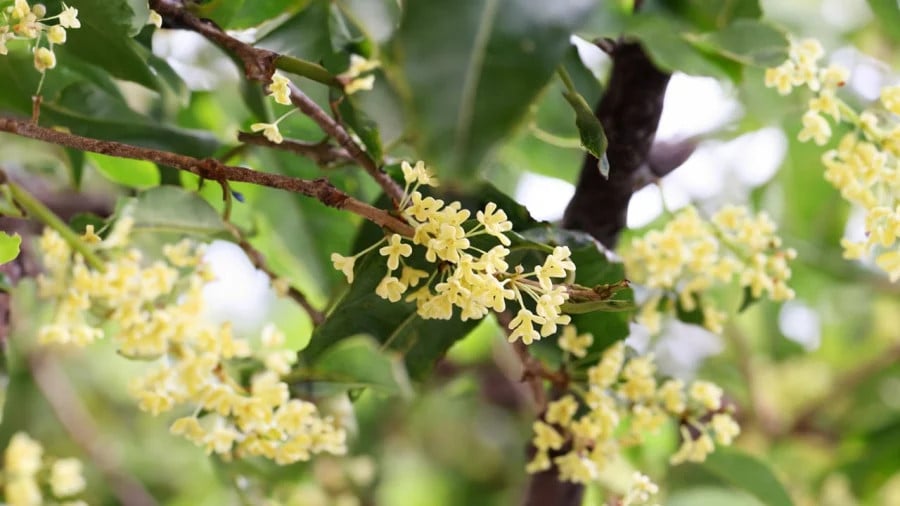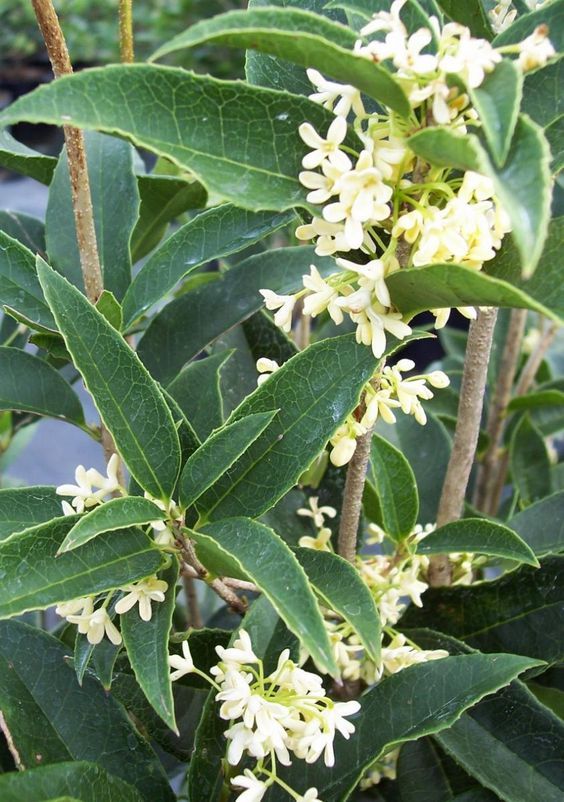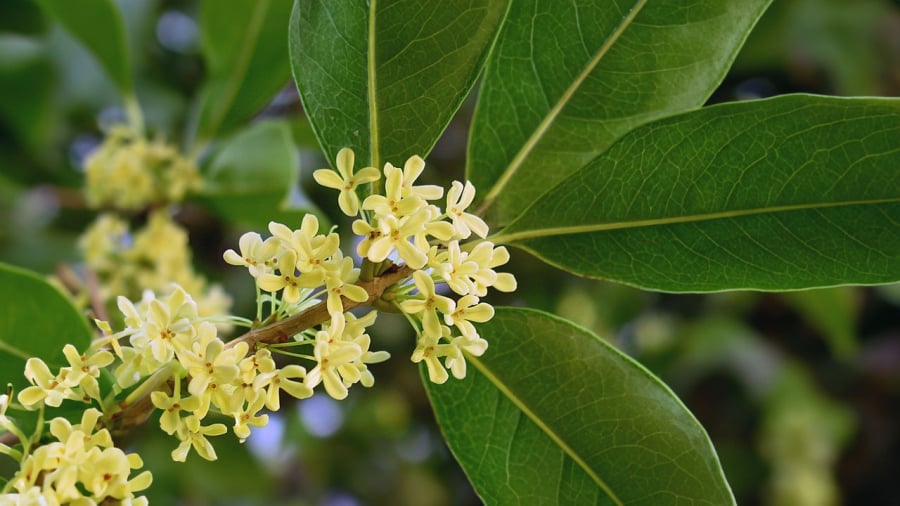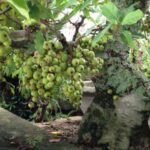The Sweet Olive tree (Osmanthus fragrans), also known as the sweet osmanthus or fragrant olive, is a plant that boasts refined beauty, a delightful fragrance, and immense feng shui, medicinal, and economic value. In Eastern culture, particularly in Asian feng shui, planting a Sweet Olive tree in front of your house not only beautifies your living space but also brings good fortune, peace, and harmony to the residents.
What is the feng shui significance of the Sweet Olive tree, and what benefits does it offer to health and well-being when planted in front of a home? Let’s explore these questions in detail below.

1. Characteristics of the Sweet Olive Tree
The Sweet Olive is an evergreen tree, typically growing to a height of 3-5 meters, although it can reach up to 10 meters under favorable conditions. Its leaves are a deep shade of green, growing in pairs with an oval shape and pointed tips. What sets the Sweet Olive apart are its small, fragrant flowers in shades of yellow, white, or orange, exuding a delicate and pleasant scent.
The flowers usually bloom in the autumn, filling the air with their sweet fragrance, likened to “heavenly scent” in ancient Chinese and Vietnamese literature.
2. Feng Shui Significance of the Sweet Olive Tree When Planted in Front of a House
2.1. Attracting Positive Energy and Prosperity: In feng shui, the Sweet Olive is considered a propitious plant, capable of absorbing negative energy, dispelling evil spirits, and inviting positive energy into the home. Planting a Sweet Olive tree in front of the main entrance or along the pathways helps regulate energy, bringing balance to the yin and yang, thereby attracting wealth and good fortune to the family.

2.2. Symbol of Nobility and Virtue: The name “Sweet Olive” alludes to the fragrance emanating from the wood, symbolizing simplicity, purity, and nobility. In Asian culture, the Sweet Olive is associated with nobility and purity, thus regarded as an emblem of a virtuous person.
Planting a Sweet Olive tree in front of your house not only enhances the aesthetics of your living space but also reflects your desire to uphold morality and traditional family values.
2.3. Promoting Family Harmony: The Sweet Olive tree is believed to have the ability to stabilize the energy surrounding a house. When planted in an appropriate location (in front of the house, avoiding blocking pathways or the main entrance), the Sweet Olive creates a positive energy flow, fostering a peaceful home, harmonious relationships between couples, and filial piety in children.
3. Practical Applications of the Sweet Olive Tree in Daily Life and Health
Apart from its feng shui significance, the Sweet Olive is also a valuable medicinal herb in traditional Eastern medicine with numerous practical uses:
3.1. Natural Air Purifier and Insect Repellent: The natural fragrance of Sweet Olive flowers effectively eliminates odors, purifies the air, and repels insects such as mosquitoes, flies, and ants. Therefore, planting a Sweet Olive tree in front of your house creates a cleaner, more pleasant, and safer living environment, especially for children.

3.2. Tea and Flavoring Agent: Sweet Olive flowers can be dried and used for flavoring tea, imparting a subtle and soothing aroma. Sweet Olive tea has a calming effect, reduces stress, aids digestion, and promotes healthy skin. Additionally, the flowers are used in baking, perfumery, and the production of natural essential oils.
3.3. Medicinal Uses in Traditional Medicine: According to traditional Eastern medicine, Sweet Olive has a pungent taste and a warm nature, benefiting the spleen and large intestine meridians. Its medicinal properties include:
Qi regulation and pain relief: treats abdominal pain, bloating, and indigestion.
Antibacterial and anti-inflammatory properties: used as a mouthwash to treat halitosis.
Stimulating digestion: often combined with other herbs to treat indigestion.
3.4. Skin Care and Beauty: Sweet Olive essential oil, derived from the flowers, is rich in antioxidants and can be used in cosmetics to soothe, moisturize, and protect the skin against aging. Some people also use Sweet Olive flower infusions as a natural facial cleanser and skin whitener.
4. Considerations When Planting a Sweet Olive Tree in Front of Your House
Planting location: Choose a spot that receives morning sunlight and is open and unobstructed, avoiding blocking pathways or the main entrance.
Avoid planting too close to the house: Ensure that the roots do not affect the foundation or walls of the house.
Regular care: While the Sweet Olive is relatively low-maintenance, it still requires periodic watering and pruning for optimal growth and fragrant flowers.
The Sweet Olive tree is not only aesthetically pleasing and fragrant but also possesses significant feng shui and health benefits. Planting a Sweet Olive tree in front of your house is a wise choice to invite prosperity, dispel negative energy, and create a peaceful and healthy living environment. If you seek a plant that offers both beauty and positive energy, the Sweet Olive tree is an ideal candidate.
Reference for further exploration
The Ancient’s Warning: A Wall Away from Wealth and Wellbeing
“Ancient wisdom dictates that positioning your bed in certain areas of the room can impact your health, sleep, and even prosperity. In particular, there are three spots you should avoid when placing your bed. These seemingly innocuous placements can have a profound effect on your overall well-being and should be considered carefully when designing your bedroom layout.”
Ancestral Teachings: Incense Offering on the 1st Day, Avoid the 3 Major Taboos for a Month of Peace and Prosperity
Introducing the art of incense burning on the first day of the month – a traditional practice observed by devout families, yet shrouded in ritualistic intricacies. Unravel the mysteries behind this ancient custom and discover the profound significance it holds for those who partake in its observance.





































